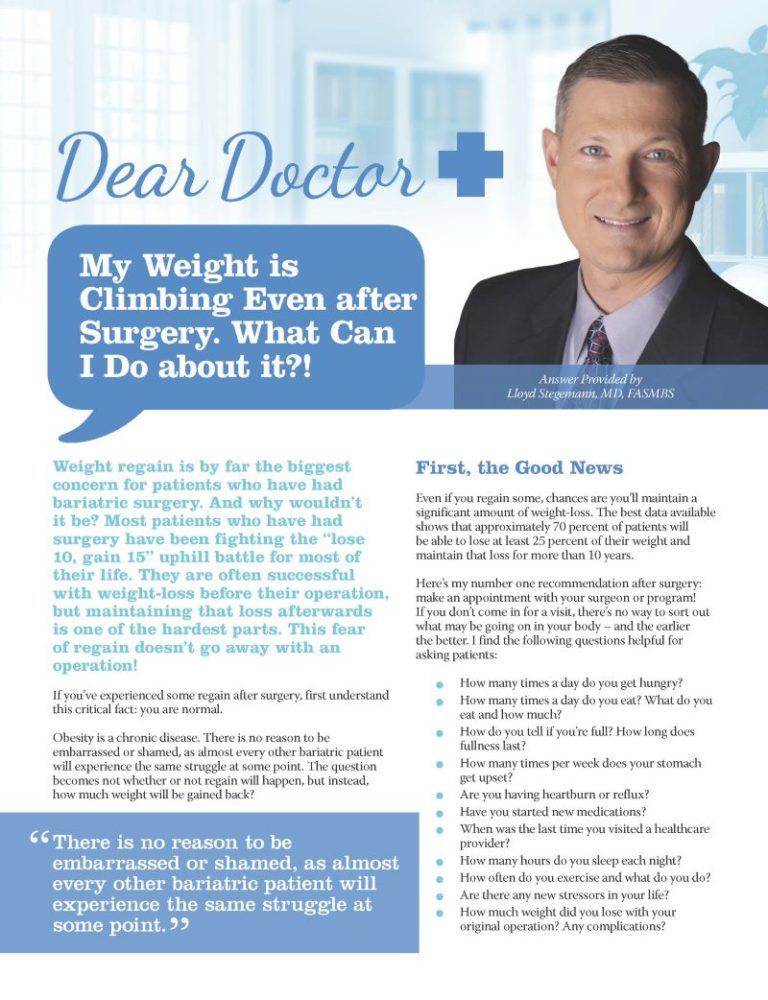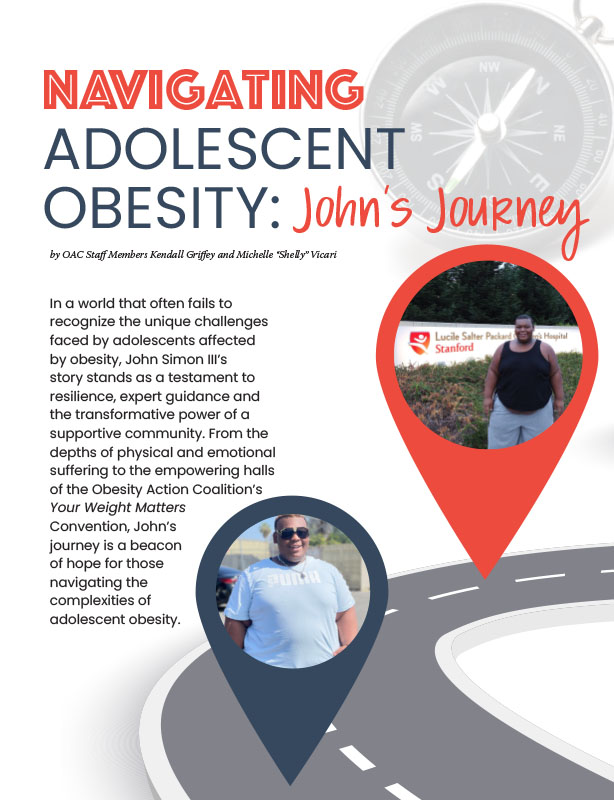Dear Doctor: My Weight is Climbing Even after Surgery. What Can I Do about it?!


Answer Provided by Lloyd Stegemann, MD, FASMBS
Winter 2019
Weight regain is by far the biggest concern for patients who have had bariatric surgery. And why wouldn’t it be? Most patients who have had surgery have been fighting the “lose 10, gain 15” uphill battle for most of their life. They are often successful with weight-loss before their operation, but maintaining that loss afterwards is one of the hardest parts. This fear of regain doesn’t go away with an operation!
If you’ve experienced some regain after surgery, first understand this critical fact: you are normal.
Obesity is a chronic disease. There is no reason to be embarrassed or shamed, as almost every other bariatric patient will experience the same struggle at some point. The question becomes not whether or not regain will happen, but instead, how much weight will be gained back?
First, the Good News
Even if you regain some, chances are you’ll maintain a significant amount of weight-loss. The best data available shows that approximately 70 percent of patients will be able to lose at least 25 percent of their weight and maintain that loss for more than 10 years.
Here’s my number one recommendation after surgery: make an appointment with your surgeon or program! If you don’t come in for a visit, there’s no way to sort out what may be going on in your body – and the earlier the better. I find the following questions helpful for asking patients:
- How many times a day do you get hungry?
- How many times a day do you eat? What do you eat and how much?
- How do you tell if you’re full? How long does fullness last?
- How many times per week does your stomach get upset?
- Are you having heartburn or reflux?
- Have you started new medications?
- When was the last time you visited a healthcare provider?
- How many hours do you sleep each night?
- How often do you exercise and what do you do?
- Are there any new stressors in your life?
- How much weight did you lose with your original operation? Any complications?
Putting the Pieces Together
Weight regain happens because of three main causes:
- Anatomical
- Medical
- Behavioral
In my experience, less than 10 percent of regain cases are related to anatomic problems with the operation or medical problems that went undiagnosed. It’s your surgeon’s responsibility to eliminate these causes before assuming regain is behavior-related (that’s weight bias)!
After visiting your surgeon, you’ll probably have several tests completed. Those tests may include bloodwork to look for undiagnosed problems and general nutrition and health. To look at the surgery anatomy, a surgeon will often order an upper GI and/or CT scan and follow-up with an upper endoscopy. This kind of testing can help you see if your regain is related to the surgery or a medical problem that was missed or not properly treated. Below you’ll find a few anatomic and medical causes of regain:
Anatomic Causes:
- Pouch/sleeve enlargement
- Sleeve narrowing (stricture)
- Large gastrojejunal anastomosis
- Gastrojejunal anastomosis narrowing (stricture)
- Gastric-gastric fistula
- Gastric ulcers
- GERD
Medical Causes:
- Thyroid problems
- Kidney/heart disease
- Adrenal gland issues
- Pregnancy
- New medications
- Injury or limited mobility
- Depression
Behavioral Causes of Regain: The Creep
I’ve never seen a bariatric surgery patient regain ALL the weight they’ve lost after surgery in just one year. Regain is more like it was prior to surgery – slowly over time. While it’s unusual for a patient to regain all the weight they lost with surgery, make no mistake – it’s possible. That’s why it’s best to see your surgeon at the first sight of regain.
Fortunately, most regain after surgery is related to old, unhealthy habits coming back into light –something I refer to as “the creep.” I say fortunately because this is often easier and safer to address than regain due to anatomical or medical issues.
If you’re experiencing regain, it’s helpful to complete a 48-hour journal to start looking for “the creep.” One of those days should be a weekday and one should be a day during the weekend. This allows you to see your daily routine while at work and on non-work days. The journal should include:
- Food Intake: Write down everything you consume from food, gum, mints, snacks and so on. Include the time of day you eat and how much as well. Write down how you felt before eating (hungry, bored, angry) and after eating (full, stuffed, nauseated).
- Liquid Intake: What do you drink? How much? What do you add to your drinks (cream, sugar, extra flavoring)? Write it all down. It’s important to track all fluid consumption.
- Sleep Log: What time do you go to bed? What time do you wake up? How many times do you get up in the night? Do you wake rested? Do you nap?
- Exercise Log: Log the type, intensity and duration of any exercise you do. It’s especially helpful if you have a fitness tracker that can count the number of steps you take in your average day.
- Stress Monitor: Estimate your stress level on a scale of 1-10. One should equal perfect (no stress at all) while 10 should signal someone better watch out!
Your bariatric surgery team will be able to use the information in your journal to customize a plan that should help to stop weight regain. Patients often benefit from a “refresher course” in nutrition, exercise and behavioral counseling. It is also quite helpful to get engaged in a support group!
Conclusion
Weight regain is very common after bariatric surgery. You should not feel embarrassed, ashamed or disappointed at what’s going on in your body. Although most patients with regain are struggling with unhealthy habits coming back into their life, some aren’t – and their regain is due to an anatomical or medical issue that needs to be addressed.
Remember that obesity is a chronic disease, and sometimes the bariatric surgery “tool” needs some tweaking to make sure it’s still effective. Don’t be afraid to reach out for help. That’s what your bariatric surgery team is there to do! I often tell patients that I feel like I have more to offer someone five years out and struggling with regain than I do for someone who is just sailing along. However, I still want both to come in for follow-up visits!
About the Author:
Lloyd Stegemann, MD, FASMBS, is a bariatric surgeon in Corpus Christi, Texas. Dr. Stegemann is a passionate advocate for universal access to bariatric surgery and is a former National Board Member of the OAC.
by Kendall Griffey, OAC Communications Manager Spring 2024 We have officially kicked off Your Weight Matters Regional…
Read Articleby OAC Staff Members Kendall Griffey and Michelle “Shelly” Vicari Winter 2024 In a world that often…
Read Articleby Rachel Engelhart, RD; Kelly Donahue, PhD; and Renu Mansukhani, MD Summer 2023 Welcome to the first…
Read Article









